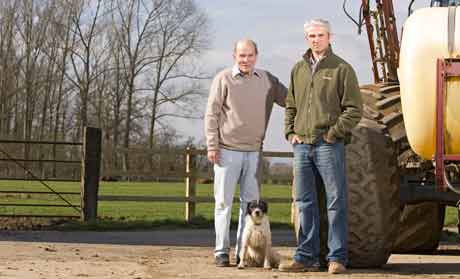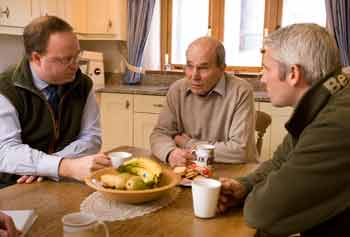Plan now to help future farming generations

Succession planning has long been something that is not given the attention it deserves in farming businesses. Older generations are often reluctant to hand over full control and some think the family farm will generate enough income to support them through retirement.
In some cases this may be true, but for many it puts extra financial and emotional pressure on the farm and perhaps means money is not available for reinvestment. Careful planning of who will take over, when, and how, is therefore something every farm should do. It can also potentially save you hundreds in inheritance tax, according to Lloyds TSB agricultural business manager Jon Drew.
“Most people have some sort of plan in place, but how developed those are is questionable,” he says. “I see plenty of businesses where wills were set up 15-20 years ago and haven’t been updated. I’d encourage everyone to have a succession plan and make sure they go back and review it as things change.”
One farming family that has got to grips with succession planning is the Clarke family, who farm 1000 acres at Tythrop Park, Kinsey, Buckinghamshire. Michael Clarke, 71, is relinquishing control of the profitable beef and arable farm to his only son Edward, 34. Both acknowledge that even though just one sibling is involved, it hasn’t been an easy process.

“I was a bit apprehensive when, at 70, I said to Edward that now you’re in charge,” Michael says. “But, having built a reasonably successful business, it was nice to know there is a future for him – many people tenant farming just 200 or 300 acres aren’t as lucky.”
The handover of control is a gradual, ongoing process, he says. Edward has worked on the family farm since leaving Shuttleworth College in 1992, and has been a partner in the farm business for 7-8 years. The business includes several cottages let on assured shorthold tenancies and it was the potential inheritance tax liability from these – and barns with planning permission for conversion – that prompted Mr Clarke to look closely at their plans for succession.
“The rented cottages don’t have an agricultural tie on them, so we decided to give away what we would get inheritance tax on.”
Most of the cottages and barns are now in Edward’s name, while all the land is owned by Michael and his wife Leah. All three are partners in the farm business.

Although Michael is in his 70s and has a private pension, he remains active on the farm and is keen not to relinquish full control. He retains responsibility for the 100+ suckler cows, but has let Edward – who is FACTS and BASIS trained – take over the running of the 650-acre arable enterprise and day-to-day business running.
“I know it’s hard for Dad to sit back and watch me be in charge, particularly as he’s now at the stage where he’s less willing to take a gamble where I am,” says Edward. “But for me to keep the business going, I have to try to persuade Dad it’s the right thing to do.”
Both father and son agree that communication is vital in any succession planning process, particularly for the younger generation to learn about all aspects of the business. “That includes the office work,” says Michael. “As I get older and less able to do physical work, it would be easy for me to sit in the office and look after the paperwork. But if Edward’s going to take on the business, he’s got to understand every aspect, including things like paying bills, and completing subsidy forms.”
Expert advice from solicitors and accountants has been vital, particularly for understanding the tax implications of succession, Michael says.
